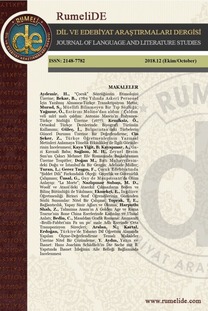Ortaöğretim T.C. İnkılâp Tarihi ve Atatürkçülük dersi kazanımlarının elde edilmesinde şiirlerin etkisine ilişkin öğrenci görüşleri
Tarih, T.C. İnkılâp Tarihi ve Atatürkçülük dersi, şiir, öğrenci görüşleri
Students’ opinions on the effect of poems in achieving the learning outcomes of secondary education Turkish Republic History of the Revolution and Ataturkism Course
History, Turkish Republic History of Revolution and Ataturkism course, poetry, students’ opinions,
___
- Büyüköztürk, Ş., Kılıç Çakmak, E., Akgün, Ö. E., Karadeniz, Ş. ve Demirel, F. (2010). Bilimsel Araştırma Yöntemleri. Ankara: Pegem Akademi.
- Candan, A. S. (2003). Tarih öğretiminde ayrıntılı okuma becerilerinin geliştirilmesi. Doktora tezi. Gazi Üniversitesi Eğitim Bilimleri Enstitüsü, Ankara.
- Certo, J. L. (2004). Cold plums and the old men in the water: Let children read and write “great” poetry. Reading Teacher, 58(3), 266-271.
- http://www.li.suu.edu/library/circulation/Marriott/eled3460lmColdPlumsOldMenWaterFall05.pdf, (Erişim Tarihi: 12.04.2009).
- Collins, P. (2008). Using poetry throughout the curriculum. Kappa Delta Pi Record, 44(2), 81-84. https://doi.org/10.1080/00228958.2008.10516500
- Çencen, N. (2010). 11. sınıf Türkiye Cumhuriyeti İnkılâp Tarihi ve Atatürkçülük dersinde tarih öğretmenlerinin “edebî ürün” kullanımına ilişkin görüşleri. Doktora tezi. Gazi Üniversitesi Eğitim Bilimleri Enstitüsü, Ankara.
- Çençen, N. ve Akça Berk, N. (2014). Ortaöğretim T. C. İnkılâp Tarihi ve Atatürkçülük dersinde “şiir kullanımına” ilişkin öğretmen görüşleri. Türk Tarih Eğitimi Dergisi, 3(1), 1-23.
- Dunning, S. (1966). Why poetry?. The English Journal, 55(2), 158-161. http://www.jstor.org/stable/810613, (Erişim: 16.02.2018).
- Harrison, D. L. & Holderith, K. (2003). Using the power of poetry to teach language arts, social studies, math and more. New York: Scholastic.
- Janeczko, P. B. (2003). Opening a door: Reading poetry in the middle school classroom. New York: Scholastic Professional Books.
- Karasar, N. (2012). Bilimsel araştırma yöntemi. Ankara: Nobel.
- Kenworth, L. S. (1937). American history in verse. The Clearing House, 12(3), 169-171. http://www.jstor.org/stable/30174956, (Erişim Tarihi: 02.03.2018).
- Kirman, J. (2007). Aesthetics in geography: Ideas for teaching geopraphy using poetry. Journal of Geography, 106(5), 207-214.
- Köksal, H. (2010). Tarih öğretiminde epik şiirlerin kullanımı. M. Safran (Ed.), Tarih nasıl öğretilir? Tarih öğretmenleri için özel öğretim yöntemleri içinde (ss. 252-257). İstanbul: Yeni İnsan.
- Liftig, I. F. (1993). Getting the point through poetry. Science Scope, 16(7), 22-24. http://www.jstor.org/stable/43177267, (Erişim Tarihi: 01.03.2018).
- McCall, A. L. (2004). Using poetry in social studies classes to teach about cultural diversity and social justice. Social Studies, 95 (4), 172-176. https://doi.org/10.3200/TSSS.95.4.172-176
- Milli Eğitim Bakanlığı (2018). Ortaöğretim T.C. İnkılâp Tarihi ve Atatürkçülük dersi öğretim programı. http://mufredat.meb.gov.tr, (Erişim Tarihi: 22.01.2018).
- Osborne, K. (1987). Poetry and the teaching of Canadian history: The poems of F. R. Scott. History and Social Science Teacher, 22(3), 152-155.
- Öztaş, S. (2009). Tarih öğretiminde şiirlerin yeri ve önemi. Uluslararası 5. Balkan Eğitim ve Bilim Kongresi "Günümüzde Balkanlarda Eğitim", Trakya Üniversitesi, 1-3 Ekim 2009, Edirne, Türkiye, C. 2, 294-298.
- Öztaş, S. (2018). Tarih derslerinde bir öğretim materyali: Edebî ürünler. RumeliDE Dil ve Edebiyat Araştırmaları Dergisi, 11, 27-41.
- Öztürk, C. ve Otluoğlu, R. (2005). Sosyal bilgiler öğretiminde edebî ürünler ve yazılı materyaller. Ankara: Pegem Akademi.
- Stiles, L. J. (1965). What shall we do about poetry in the schools? The Elementary School Journal, 65(4), 175-178. http://www.jstor.org/stable/999139, (Erişim Tarihi: 16.02.2018).
- Şengül Bircan, T. ve Arıdil, Ş. (2015). İlköğretim sosyal bilgiler dersinde bir edebi ürün olarak "şiir" kullanımına ilişkin öğrenci görüşlerinin değerlendirilmesi. M. Şahingöz (Ed.), Kaşgarlı’nın tarihçi torunu Reşat Genç armağanı içinde (ss. 361-371). Ankara: Türk Kültürünü Araştırma Enstitüsü.
- Ulusoy, K. ve Gülüm, K. (2009). Sosyal bilgiler dersinde tarih ve coğrafya konuları işlenirken öğretmenlerin materyal kullanma durumları. Ahi Evran Üniversitesi Eğitim Fakültesi Dergisi, 10(2), 85-99.
- Vardell, S. M. (2006). Poetry aloud here!: Sharing poetry with children in the library. Chicago: American Library Association.
- Walders, D. (2000). Poetry and science education. ERIC Digest. ED 463946. http://www.ericdigests.org/2003-1/poetry.htm, (Erişim: 16.02.2018).
- Wilson, C. ve Kahn, B. B. (2008). Using poetry to teach the holocaust: Rationale and strategies for the middle level learner, North Carolina Middle School Association Journal, 23(1).
- http://www.ncmsa.net/journal/PDF/Feb08/Using-poetry.pdf, (Erişim Tarihi: 04.12.2009).
- Yakar, H. ve Yıldırım, T. (2021). Ortaöğretim tarih ders kitaplarında edebî ürünlerin kullanımı. Ahi Evran Üniversitesi Sosyal Bilimler Enstitüsü Dergisi, 7(2), 409-426.
- ISSN: 2148-7782
- Yayın Aralığı: 6
- Başlangıç: 2014
- Yayıncı: Yakup YILMAZ
Öğretmen adaylarının serbest yazma tutumlarında öğretmen öz yeterlik algılarının yordayıcılığı
Klasik Türk şiirinde yağmurla ilgili tasavvurlar
Çocuk kitaplarında çatışma söylemi: Alacağınız Olsun
Öğretmen görüşlerine göre salgın (COVİD-19) dönemi uzaktan eğitim ortamında Türkçe eğitimi
21. yüzyıl becerileri bağlamında öğrenci, öğretmen ve eğitim ortamları
Serkan ÇİFTCİ, Abdulkadir SAĞLAM, Ahmet YAYLA
Reşat Coşkun şiirinin tematik bağlamda tahlili
Samipaşazade Sezai’nin “Düğün” hikâyesinde veremin kadın psikolojisi bağlamında irdelenmesi
